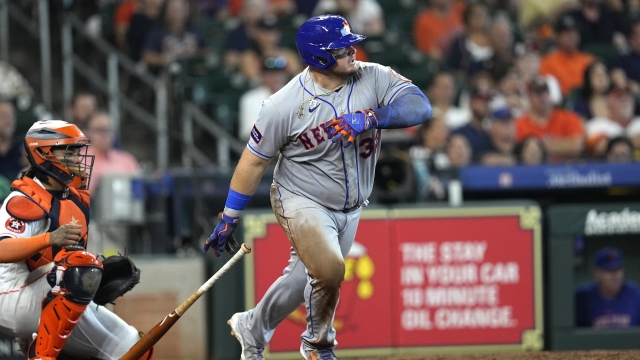The Major League Baseball draft combine is underway in Phoenix this week as players from around the country show their best stuff in hopes of being drafted to the major leagues.
Some of those players already have signed contracts — not with teams, but with companies who have invested in their potential.
The practice is known as third-party ownership (TPO), in which a player will get an up-front cash payment in exchange for a percentage of their future earnings.
Fernando Tatis Jr., a shortstop for the San Diego Padres, was one of those players. Prior to the 2021 Major League Baseball season, Tatis Jr. signed the third-most lucrative deal in sports history at the time: A 14-year, $340 million contract. But before ever signing with the Padres, Tatis Jr. signed with Big League Advantage, a third-party ownership company, in 2017 while he was still playing in the Dominican Republic's Winter League.
"This is not a new idea. It's been around a long time," said Stefan Szymanski, a professor of sport management at the University of Michigan. "If you think about it, it's just like investing in the stock exchange, only you're investing in people as assets rather than businesses as assets."
Former MLB pitcher ` founded Big League Advantage in 2016 after a two-year career in the pros that led to him becoming a union rep for the Major League Baseball Players Association. To date, Schwimer says the company has signed more than 530 players like Tatis Jr., hoping they hit it big.
"This is a partnership with players," said Schwimer. "I would not have started a company [that says] here's money, we get a percentage of your earnings, good luck. That is not what we're about at all as a company. We're about helping these athletes and their families."
SEE MORE: College betting scandals shine light on campus wagering
Schwimer says the average cash payment to players is $350,000 with a percentage of equity for every $50,000 to $100,000 given. If the player does not make it to the majors, they do not have to pay the company back.
In Tatis Jr.'s case, he owed Big League Advantage anywhere between $3.5 million to $50 million after his mega-deal with the Padres, depending on the contract he negotiated with BLA.
"In sports, man, it's tough," said Schwimer. "I mean, it's a matter of inches and very few things make a difference and the more money you have as a player, the more likely you are to make it. You can always invest in yourself [through dieting and training regimens]."
Baseball is one of the most difficult sports to excel in. Only a small percentage of minor leaguers make it to the majors, and even a smaller chunk sticks around long enough to see a lucrative contract. Big League Advantage develops algorithms to predict the players that will excel, and then invests in them before they are well-known commodities so players can use the money for their development.
"Look how terrible minor leaguers have it, no wonder they would want to have a chance to have a decent amount of cash up front because they're paid very poorly and living three to four players in a one-bedroom apartment and things like this," said Joel Maxcy, the head of the Sport Business Department at Drexel University.
Before Major League Baseball changed its policies in late March, the lowest salary allowed at the highest level of the minors (Triple A) was $17,500. It makes these deals attractive, but some question the power dynamics of players strapped for resources.
SEE MORE: MLB to start approval process to move Oakland Athletics to Las Vegas
"If you're talking about 25-year-old minor league baseball players who have a college education and want to go on trying to make it to the majors — if they want to do that trade to fund themselves, I don't see a problem with that," said Szymanski. "What I do see [as problematic] is going to the parents of some 16-year-old kid living in poverty in the Dominican Republic and doing a deal with them. I don't think one can draw a hard and fast rule and say it's always good or it's always bad — I think, to be honest, it depends on the circumstances."
Schwimer says Big League Advantage does not sign contracts with any player younger than 18. He also says of the 530 players that have signed with BLA since its inception, every one has had a conversation with a lawyer to ensure fairness and competency moving forward. In Tatis Jr.'s case, the company has a video on its website where his father, former MLB player Fernando Tatis, says Tatis Jr. would not be the player he is today without the deal he signed with Big League Advantage.
"These Big League Advantage deals are the same deals that Jeff Bezos did, Elon Musk has done, and every other entrepreneur you could probably imagine," said Schwimer. "And I wanted to give athletes the same opportunity because in sports, man, it's tough."
In 2015, FIFA, which oversees soccer worldwide, banned third party ownership. The practice has helped propel some of the game's most notable names to stardom, including Neymar and David Luiz of Brazil, Ángel Di María of Argentina, and Radamel Falcao and James Rodríguez of Colombia. FIFA said the ban came over concerns of the strong influence that investors have on players and teams.
Trending stories at Scrippsnews.com




